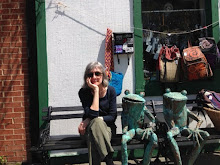Religious education is a puzzle and a challenge. Jewish religious education is perhaps even more of a puzzle and a challenge, because Judaism is a culture overlapping with a religion. How are cultural and religious values best transmitted from one generation to the next?
Rivers of ink have been spilled about the merits and pitfalls of various types of Jewish education, and about the "watering-down" of Jewish knowledge with each generation, etc; I can't begin to address all of that here. I just want to speak from the heart:
We need to have the courage to leave behind the post-WWII model of religious education that no longer serves our purposes today. In fact, it hasn't served our purposes for several decades! - but somehow we keep re-creating it, perhaps simply because it feels familiar.
But the lesson of the past several decades is clear: Sending the children off to religious school and hoping in some vague way that someone else will "make them Jewish" - when Jewish activity in the home is minimal or non-existent - just doesn't work. Critics have dubbed this old model "pediatric Judaism" - and its weaknesses are manifold. Yet somehow the ghost of this approach is still alive several generations later.
We care about our children and want them to be engaged in Jewish education. So how do children in the 21st century learn to love Judaism (when parents may not feel like they know enough to spark that love)? How do children learn to feel good about their identity as Jews (when parents might feel conflicted)? There is one finding from researchers over the past several decades which I find incredibly inspiring: Our children develop positive identities as Jews to the extent that they witness their parents and other adults exploring and enjoying Judaism themselves.
Notice that I said "exploring and enjoying" - that's not the same thing as "knowing a lot." You can transmit a love of Judaism to your children by modeling that it is something to be explored and enjoyed for a lifetime, even if you yourself don't know much about it. (You may even be the non-Jewish parent!)
This simple yet profound finding provides the underlying principle for the Community Learning program we are creating at Temple Israel in Easton. "Community" means everyone -- parents and non-parents, Jews and non-Jews, children and teens. Community Learning sessions are theme-based, with some themes extending over more than one week. We talk, we sing, we do artwork, acting, etc. It's about being engaged - together - in an exploration of the richness of Judaism.
Life-long learning is a fundamental Jewish value. Make it happen in your life, and watch the influence it will have on the children.
Rivers of ink have been spilled about the merits and pitfalls of various types of Jewish education, and about the "watering-down" of Jewish knowledge with each generation, etc; I can't begin to address all of that here. I just want to speak from the heart:
We need to have the courage to leave behind the post-WWII model of religious education that no longer serves our purposes today. In fact, it hasn't served our purposes for several decades! - but somehow we keep re-creating it, perhaps simply because it feels familiar.
But the lesson of the past several decades is clear: Sending the children off to religious school and hoping in some vague way that someone else will "make them Jewish" - when Jewish activity in the home is minimal or non-existent - just doesn't work. Critics have dubbed this old model "pediatric Judaism" - and its weaknesses are manifold. Yet somehow the ghost of this approach is still alive several generations later.
We care about our children and want them to be engaged in Jewish education. So how do children in the 21st century learn to love Judaism (when parents may not feel like they know enough to spark that love)? How do children learn to feel good about their identity as Jews (when parents might feel conflicted)? There is one finding from researchers over the past several decades which I find incredibly inspiring: Our children develop positive identities as Jews to the extent that they witness their parents and other adults exploring and enjoying Judaism themselves.
Notice that I said "exploring and enjoying" - that's not the same thing as "knowing a lot." You can transmit a love of Judaism to your children by modeling that it is something to be explored and enjoyed for a lifetime, even if you yourself don't know much about it. (You may even be the non-Jewish parent!)
This simple yet profound finding provides the underlying principle for the Community Learning program we are creating at Temple Israel in Easton. "Community" means everyone -- parents and non-parents, Jews and non-Jews, children and teens. Community Learning sessions are theme-based, with some themes extending over more than one week. We talk, we sing, we do artwork, acting, etc. It's about being engaged - together - in an exploration of the richness of Judaism.
Life-long learning is a fundamental Jewish value. Make it happen in your life, and watch the influence it will have on the children.
